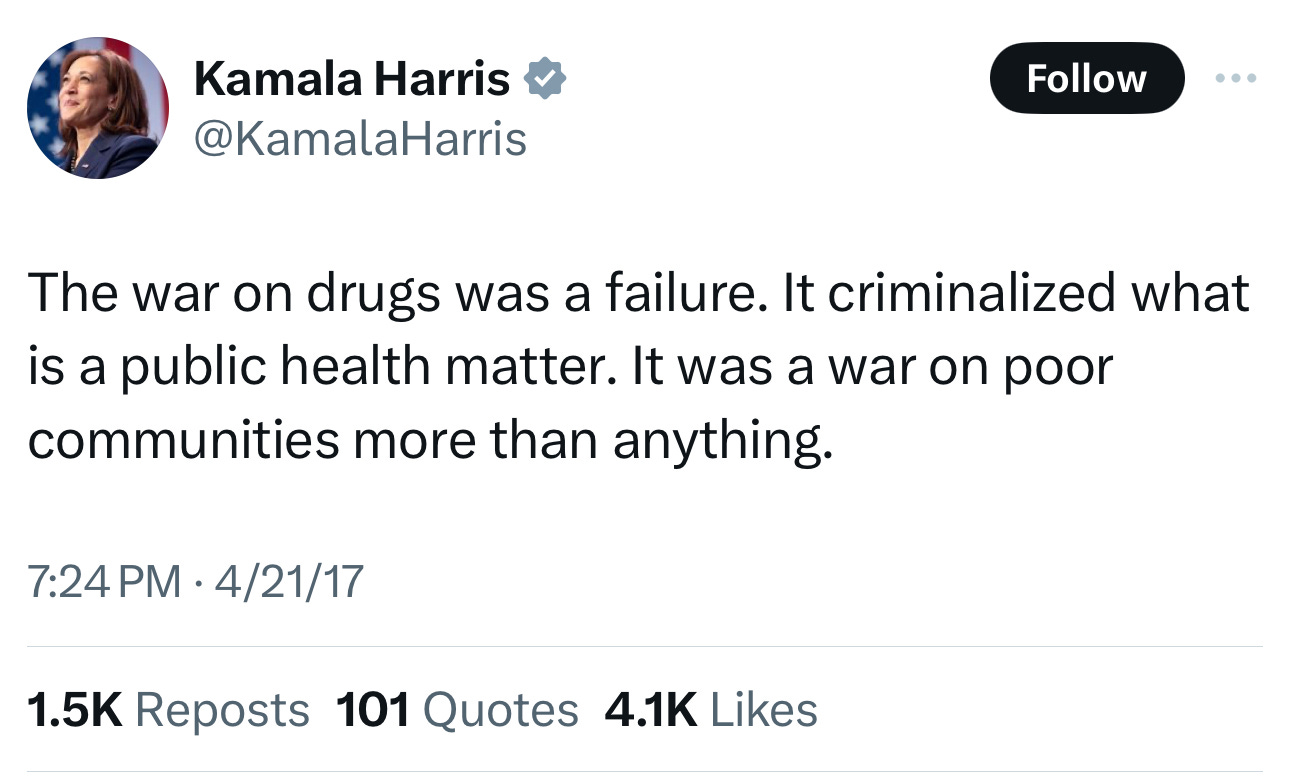Does Kamala Harris want to decriminalize fentanyl and other drugs - and release people convicted of possessing them?
She did in 2019. In the wake of the titanic failure of Oregon's experiment with drug decriminalization, has she changed her views? And will anyone ask her?
The question to Kamala Harris at a 2019 Texas conference couldn’t have been clearer:
“Would you broadly use your pardon power as president to release federal prisoners who are in prison merely for drug possession and drug-related crimes?” [emphasis added]
Harris, four months into her failed 2020 presidential run, responded just as clearly:
“Absolutely, and we have to have the courage to recognize there are a lot of folks who have been incarcerated who should not have been incarcerated.”
—
(The truth, whether Kamala Harris likes it or not. For less than 20 cents a day.)
—
These days, Harris isn’t so courageous when it comes to drug policy.
These days, she goes out of her way to obscure her views.
The “issues” page on her 2024 campaign Website says nothing about her oft-repeated view cannabis should be federally legalized - much less more controversial questions, like whether she favors decriminalizing the use of drugs like fentanyl and cocaine.
But from 2017 through 2019, as Harris was trying to gain Democratic support for her presidential run, she was not so cautious. She repeatedly said the United States needed to pivot to treating drug use as a public health crisis, not an issue for the criminal justice system - words drug policy “reformers” understand as code for decriminalizing possession and use.
In 2019, Harris let the mask slip all the way. In response to a question from the American Civil Liberties Union asking, “will you support the decriminalization at the federal level of all [emphasis added] drug possession for personal use?” —
Harris answered yes.
Decriminalization is not the same as full legalization, which allows the open production, trafficking, marketing and sale of drugs. Still, decriminalization lets users possess drugs for personal consumption and thus means that they cannot be arrested in most cases.1
—
Like the question about pardons Harris faced at the “She The People” conference on April 24, 2019, in Houston, the ACLU’s question clearly included drugs other than cannabis, and Harris didn’t answer it that way.
Further, in a 15-page position paper on criminal justice she released for her 2019 campaign - a paper that contains the details so lacking from her “issues” Website today - Harris wrote, “it is past time to end the failed war on drugs, and it begins with legalizing marijuana.” [emphasis in original]
She added she supported “rehabilitation over incarceration for drug-related offenses.”
In other words, Harris saw cannabis legalization as only the first step in broader efforts to reduce penalties on drugs.
—
(You tell ‘em! But not now, don’t tell ‘em now! Things have changed.)
—
It is fair to say that Harris’s views aren’t as popular now as they were five years ago.
The crime spike that followed the Black Lives Matter-led effort to defund the police led many Americans to rethink the left’s softer approach to criminal justice. So did the breakdown in public order in the downtowns of many cities - particularly on the West Coast.
Meanwhile, “harm reduction” policies like increasing access to the overdose reduction drug naloxone and spending on addiction treatment have made no visible dent in the fentanyl/opioid crisis. In fact, deaths are higher under the Biden administration than Donald Trump’s presidency.
But the biggest and most visible failure of drug decriminalization since 2019 came in Oregon. That state abandoned a first-in-the-nation decriminalization effort this March, only three years after it began, because of soaring overdose deaths and crime.
—
(Reporting the stories you won’t see anywhere else. With your help.)
—
So where does Kamala Harris stand now on drugs and drug policy?
Does she still believe that fentanyl, cocaine, methamphetamine, and other drugs should be legal for personal use? Does she still plan to “broadly” release federal prisoners who have been convicted of “drug-related” crimes?
Considering that over 400,000 Americans will die of overdoses during the Biden Administration despite massive efforts at “harm reduction” and the “destigmatization” of drug use, she really ought to tell us.
But she hasn’t.
And reporters are apparently too busy worrying about Taylor Swift’s endorsement to ask.
It also effectively legalizes low-level dealing, because police cannot readily distinguish whether someone is holding a small amount drugs for himself or to sell, and the penalties for low-level dealing in a decriminalized state are so small they are unlikely to go to the trouble to make an arrest in any case.





If she doesn’t take questions she’ll never be asked. The strategy has worked quite well so far.
If asked, she won’t be honest. She has done complete turn around from all her beliefs because she knows she won’t be elected if she’s honest. Like a true Marxist, she will say whatever it takes. Once in office the real Kamala will be revealed. By then, it’s too late and this country will continue its road to destruction.